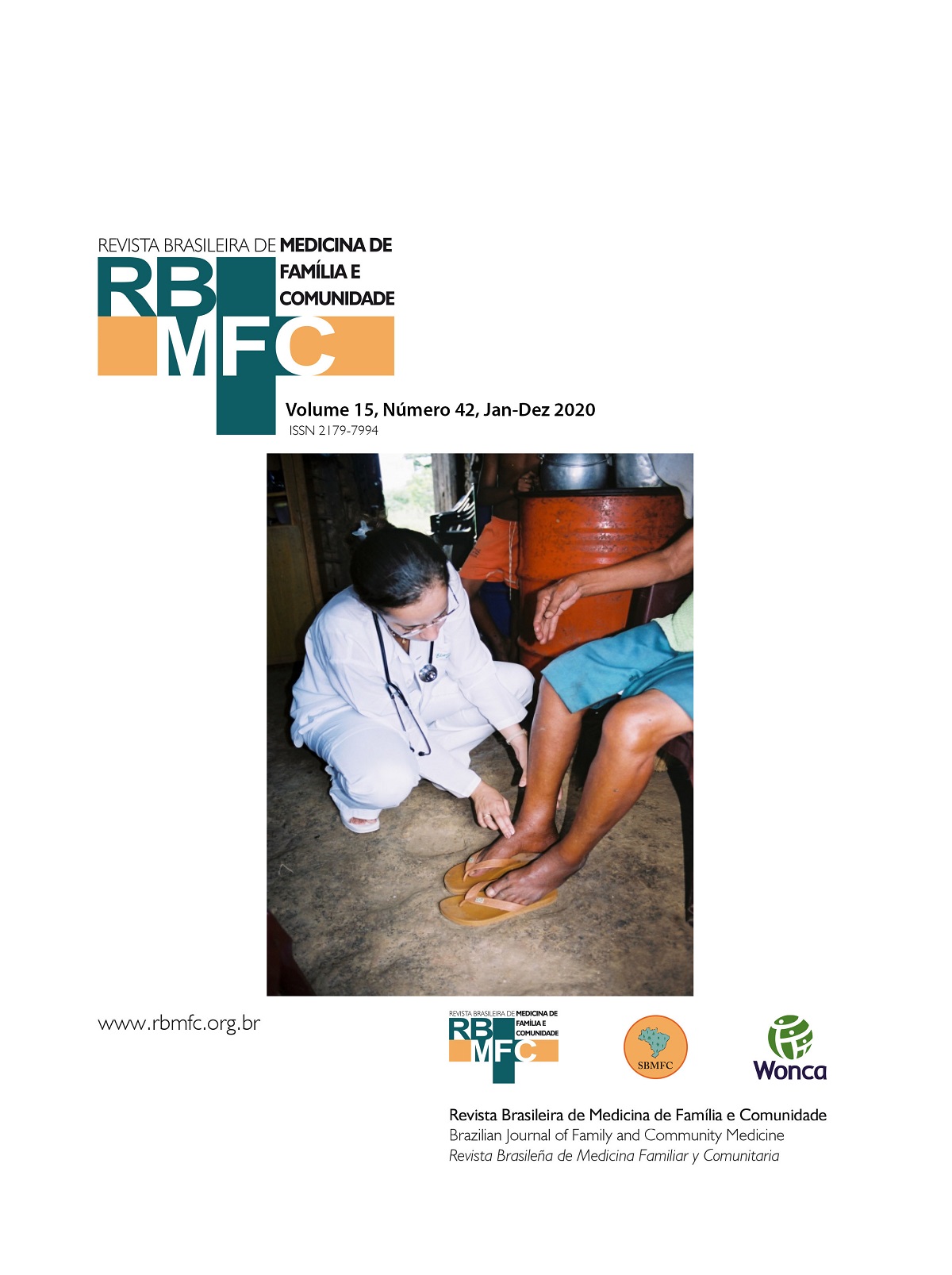Estrés por calor en la Atención Primaria a la Salud: una revisión clínica
DOI:
https://doi.org/10.5712/rbmfc15(42)1948Palabras clave:
Trastornos de Estrés por Calor, Calor, Ola de Calor, Agotamiento por CalorResumen
Introducción: La exposición nociva al calor gana más destaque con la progresión del calentamiento global antropogénico, y la Atención Primaria a la Salud tienen un papiel cresciente en este escenario. En Brasil las olas de calor entre 2014 y 2015 duraron más tiempo que en los años previos, además entre 2000-2015 la asociación entre temperatura y hospitalizaciones ha variado de acuerdo con la duración de la exposición al calor. En este contexto, el objetivo de esta revisión es realizar una actualización sobre manejo clínico de patologías relacionadas al calor en la APS. Metodología: Se realizó la búsqueda en la base de datos ACCESSS, que utiliza la pirámide 5.0 de la asistencia a la salud basada en evidencias. Se han identificado 103 sumarios sintetizados para referencia clínica con las palabras “Heat stress”, “Heat Stroke”, “Heat Wave” y “Heat Exhaustion”, pero sólo tres son considerados en el ámbito de este estudio. Resultados y Discusión: El estrés por el calor es una condición común, descuidada y evitable que afecta a varios pacientes, iniciándose con una mala adaptación al calor que si no se corrige puede generar una cascada de eventos inflamatorios. El estrés por el calor se caracteriza por síntomas inespecíficos, como malestar, cefalea y náuseas. El tratamiento implica el enfriamiento del paciente y el monitoreo, garantizando la hidratación adecuada. El agotamiento por el calor, si no se trata, puede evolucionar hacia la insolación, una enfermedad grave que puede llevar al coma y a la muerte, involucrando disfunción del sistema nervioso central - necesitando un tratamento más agresivo además del enfriamiento.
Descargas
Métricas
Citas
Watts N, Ammann M, Arnell N, Ayeb-Karlsson S, Belesova K, Berry H, et al. The 2018 report of the Lancet Countdown on health and climate change: shaping the health of nations for centuries to come. Lancet [Internet]. 2018; [acesso 2019 Abr 28]; 392(10163):2479-514. https://doi.org/10.1016/S0140-6736(18)32594-7 DOI: https://doi.org/10.1016/S0140-6736(18)32594-7
Xie E, de Barros EF, Abelsohn A, Stein AT, Haines A. Challenges and opportunities in planetary health for primary care providers. Lancet Planetary Health. 2018;2(5):e185-e187. https://doi.org/10.1016/S2542-5196(18)30055-X DOI: https://doi.org/10.1016/S2542-5196(18)30055-X
WONCA. Declaration calling Family Doctors of the world to act on Planetary Health [Internet]; 2019; [acesso 2019 Abr 28]. Disponível em: http://www.globalfamilydoctor.com/Decplanethealth
Floss M, Barros E. Saúde planetária: conclamação para a ação dos médicos de família de todo o mundo. Rev Bras Med Fam Comunidade [Internet]. 2019 Mar 1; [acesso 2019 Abr 28];14(41):1992. https://doi.org/10.5712/rbmfc14(41)1992
Floss M, Barros E, Bressel M, Hacon S, Stein A, Sirena S, et al. Lancet Countdown 2018 Report: Briefing for Brazilian Policymakers Lancet Countdown [Internet]. 2018; [acesso 2019 Abr 28]; 1:19. Disponível em: http://www.lancetcountdown.org/media/1417/2018-lancet--countdown-policy-brief-brazil.pdf
Hoag H. How cities can beat the heat. Nature [Internet]. 2015; [acesso 2019 Abr 28]; 524(7566):402-4. https://doi.org/10.1038/524402a DOI: https://doi.org/10.1038/524402a
Glazer JL. Management of heatstroke and heat exhaustion. Am Fam Physician [Internet]. 2005; [acesso 2019 Abr 28]; 71(11):2133-40. Disponível em: https://www.aafp.org/afp/2005/0601/p2133.html
Fontenelle LF, Brandão DJ. Uma proposta metodológica para a elaboração de revisões clínicas. Rev Bras Med Fam Comunidade [Internet]. 2018; [acesso 2019 Abr 12];13(40):1-10. https://doi.org/10.5712/rbmfc13(40)1871 DOI: https://doi.org/10.5712/rbmfc13(40)1871
Glazer JL. Heat Stroke. London: BMJ [Internet]; 2018; [acesso 2019 Abr 28]. Disponível em: https://bestpractice.bmj.com/topics/en-us/849
Heat-related illnesses. Dynamed Plus. Ipswich (MA): EBSCO Information Services [Internet]; 2016; [acesso 2019 Abr 28]. Disponível em: http://www.dynamed.com/topics/dmp~AN~T114802
Acute heat illnesses [Internet]. EBM Guidelines; 2018 [acesso 2018 Set 13]. Disponível em: https://www.ebm-guidelines.com/dtk/ebmg/home?id=ebm00377
Gauer R, Meyers B. Heat-Related Illnesses. Am Fam Physician [Internet]. 2019; [acesso 2019 out 01]; 99(8):482-9. Disponível em: https://www.ncbi.nlm.nih.gov/pubmed/30990296?dopt=Abstract
Health Canada. Extreme Heat Events Guidelines: Technical Guide for Health Care Workers. In: Water AaCCB, ed. Extreme Heat Events Guidelines: Technical Guide for Health Care Workers [Internet]. Ottawa: Health Canada; 2011; [acesso 2019 out 01]; p. 149. Disponível em: https://www.canada.ca/en/health-canada/services/environmental-workplace-health/reports-publications/climate-change-health/extreme-heat-events-guidelines-technical-guide-health-care-workers.html#a7.0
Nadesan K, Kumari C, Afiq M. Dancing to death: A case of heat stroke. J Forensic Leg Med. 2017;50:1-5. https://doi.org/10.1016/j.jflm.2017.05.008 DOI: https://doi.org/10.1016/j.jflm.2017.05.008
Bouchama A, Dehbi M, Mohamed G, Matthies F, Shoukri M, Menne B. Prognostic factors in heat wave related deaths: a meta-analysis. Arch Intern Med. 2007;167(20):2170-6. https://doi.org/10.1001/archinte.167.20.ira70009 DOI: https://doi.org/10.1001/archinte.167.20.ira70009
Groot E, Abelsohn A, Moore K. Practical strategies for prevention and treatment of heat-induced illness. Can Fam Physician [Internet]. 2014; [acesso 2019 out 01]; 60(8):729-30, e392-4. Disponível em: https://www.ncbi.nlm.nih.gov/pmc/articles/PMC4131963/?report=classic
Descargas
Publicado
Cómo citar
Número
Sección
Licencia
Al enviar un manuscrito al RBMFC, los autores conservan la propiedad de los derechos de autor del artículo y autorizan a RBMFC a publicar ese manuscrito bajo la licencia Creative Commons Attribution 4.0 e identificarse como el vehículo de su publicación original.















